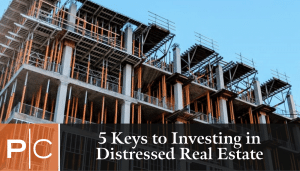Why is Real Estate a Good Investment?
By Ed Rogan, Owner, Co-Founder

Institutional investors flock to real estate for several reasons, including cash flow generation, appreciation potential, tax advantages, and the ability of some types of real estate, like multi-family or self-storage, to withstand, or even benefit from, a negative economic outlook. However, the commercial real estate space is by no means the private domain of the ultra-wealthy.
The benefits mentioned above are also attainable for accredited investors, and even those that are just beginning their wealth-building journey. If you’re looking to get involved yourself, Penn Capital offers access to private market real estate, making it possible for qualified investors to access the returns once reserved for institutional investors.
In this piece, we are going to examine what makes real estate such a good investment for all investors.
Profitability
One way or another, you're in the markets to make a good return on your investment. Commercial real estate offers multiple paths to profitability, including cash flow from tenant rents, property appreciation, and unmatched tax advantages, all of which we will look into in more detail a bit later.
Sign up to receive our educational newsletter and to gain exclusive access to our next investment opportunity.
Passive Income
Real estate offers investors the ability to create regular passive income from their assets. This either takes the form of acquiring properties and hiring management companies to oversee them or investing in a managed real estate fund or crowdfunding project where you let seasoned professionals take the reins, and your only responsibility is cashing checks.
Get involved in the real estate game today by contacting Penn Capital. We can help you get started leaps and bounds ahead of most newcomers.
Appreciation
Commercial properties often benefit from property appreciation, which just means that the value of the property increases over time. You can acquire a commercial real estate asset, benefit from its cash flow, and also generate returns from the eventual sale of the property. While property appreciation is by no means guaranteed, buying in areas with strong underlying fundamentals can help ensure that your asset rises in value over time.
Buying vs. Renting
The number of Americans who rent, rather than own their own homes is the highest it has ever been, with over 100 million Americans living in rental properties, or 34% of the total US population. Multi-family investors are well-positioned to take advantage of this trend, which shows no signs of decline, and actually appears to be speeding up.
Taxation
Real estate is arguably the most tax-advantaged of the major asset classes available to investors. Here are a few of the reasons why real estate excels in this regard:
Depreciation
The ability to deduct property depreciation is a phenomenal benefit for commercial property owners. The IRS defines the depreciation deduction as "an allowance for the exhaustion, or wear and tear" of a given property. Essentially, investors are allowed to recover many of the costs associated with income-producing properties through yearly tax deductions.
Currently, owners of commercial properties are permitted to deduct an equal proportion of the value of a commercial property each year over 27.5 years. While the deduction is for property upkeep and maintenance, there is no requirement that proceeds from depreciation be used in a specific manner. Property depreciation is categorized as a net loss for an investment property, regardless of whether or not the property creates positive cash flow.
Real Estate Tax Deductions
In a similar vein to depreciation, as a rental property owner you can deduct almost your property management expenses. That includes mortgage interest, as well as goods and services you spend money on in the course of running your property.
In addition to deductions and depreciation, commercial property owners can also defer taxes and use those funds to acquire more assets, which we’ll get into later.
Control
Real estate offers a greater deal of control over the direction and success of your investment. The overwhelming majority of investors in the stock market are dependent on the management of the companies in which they invest. Aside from researching strategies and the management team before making the investment, you have little sway over business decisions and thus little influence on how well the stock does in the long run.
In contrast, real estate investors can have a demonstrable effect on the failure or success of their properties through direct management or through overseeing the operations of a property manager. Investors can increase yields by reducing vacancies, marketing to potential tenants, renovating and adding value to their properties, and undertaking various other strategies to increase cash flow and force appreciation.
Demand

After oxygen, water, and food, shelter is our most basic need. No matter how down the stock market is, people will still need a place to lay their heads at night. As we mentioned earlier, multi-family demand is growing year after year and shows no signs of slowing down. This demand drives cash flow and decreases vacancy, but it also creates a countercyclical resistance to economic downturns.
As homeowners or renters downsize, they often choose to move into multi-family properties. That cash flow from renters will not only sustain you during a recession, it can put you in a position to take full advantage of the discounted assets that inevitably come to market during a recessionary period.
Download Penn Capital’s free guide on investing in multi-family real estate. This unique investment opportunity gives sophisticated investors a chance to maximize income yield while minimizing overall portfolio risk.
Diversification
Sir John Templeton, the legendary American-British investor, once remarked: "Diversify. In stocks and bonds, as in much else, there is safety in numbers." What he meant by this was that having interests across sectors and companies provides investors with protection from volatility, as market failures and other catastrophic financial events are unlikely to wipe out a diversified portfolio.
Most people think about diversity in terms of companies or sectors, but it’s also true of asset classes. A portfolio that is solely invested in mutual funds or stocks or bonds is not as diversified as one that consists of multiple asset classes, including those with real estate assets.
Within the commercial real estate world there are ways to diversify within the class but focusing on different property types like shopping, retail, self-storage, multi-family, etc. Multi-family, in particular, is an excellent way to diversify outside of traditional stocks and bonds due to its ability to withstand recessionary pressures, resistance to stock market volatility, steady cash flow, and potential for asset appreciation.
Predictable Cash Flow
After acquiring a rental property, whether it is in the multi-family space, retail, industrial, or shopping, you are going to benefit from regular cash flow from tenant rents. Cash flow on its own merits is an excellent benefit, but when used to leverage new property acquisitions through financing, it can be a substantial driver of short and long-term profitability.
The regular influx of cash from commercial real estate assets is particularly attractive for those edging closer to retirement, who want an asset that both grows over time and provides a regular income to sustain them in their golden years.
Deferrable Gains
Commercial real estate investors can use a 1031 Exchange to defer paying taxes on their gains and instead use that capital to invest in other projects. 1031 Exchanges derive their name from Section 1031 of the tax code, which allows individuals to sell assets and carry their basis forward into a new property of equal or more value. Put another way, real estate investors can use the tax code to sell an investment property and buy a new one and continue to defer taxes until the property is sold, or the investor makes use of another 1031 Exchange.
What’s Next for the US Economy?
The US economy's current combination of healthy economic activity, robust property fundamentals, low-interest rates, and the general attractiveness of commercial real estate as an asset class all point to a situation where the commercial real estate and multi-family markets remain steadfast in these volatile times.
The previous pages are just an intro to the myriad benefits offered by investments in the commercial real estate sphere. Each class is unique, and this affords investors the ability to pick and choose the best types of real estate to suit their individual portfolio, whether that be multi-family, retail, office, or any other type of commercial property. You can match your individual risk tolerance to a particular sector, or market, to fit it into a healthy, diverse portfolio.
To answer the question at hand: real estate is a good investment because it offers investors stable cash flow, appreciation potential, tax benefits, and may act as a shelter during recessionary periods.
Contact us today if you want to find out how you can get the best returns on your real estate investments.
RELATED ARTICLES
5 Keys to Investing in Distressed Real Estate
5 Keys to Investing in Distressed Real Estate By Ed Rogan, Owner, Co-Founder Buying distressed real estate certainly isn’t for the faint of heart. An inexperienced investor can easily be swayed by the promise of a project sponsor who doesn’t actually have a plan for turning the property around. But that doesn’t mean you shouldn’t…
READ MORE >Gaining an Edge through Cold Calling
Gaining an Edge through Cold Calling By Ed Rogan, Owner, Co-Founder In many ways, commercial real estate is an “eat what you can kill” industry. The most successful investors, developers, brokers and other CRE professionals earn their living by scouring the market to uncover the next big deal. Ask the industry’s best and they’ll often…
READ MORE >Trial by Fire: How We Got Started
Trial by Fire: How We Got Started By Ed Rogan, Owner, Co-Founder People often use the term “trial by fire” to explain how they learned something. In our case, the term is all too appropriate. Looking back on it, the story of how Percy and I got started almost seems unbelievable. We were just…
READ MORE >


